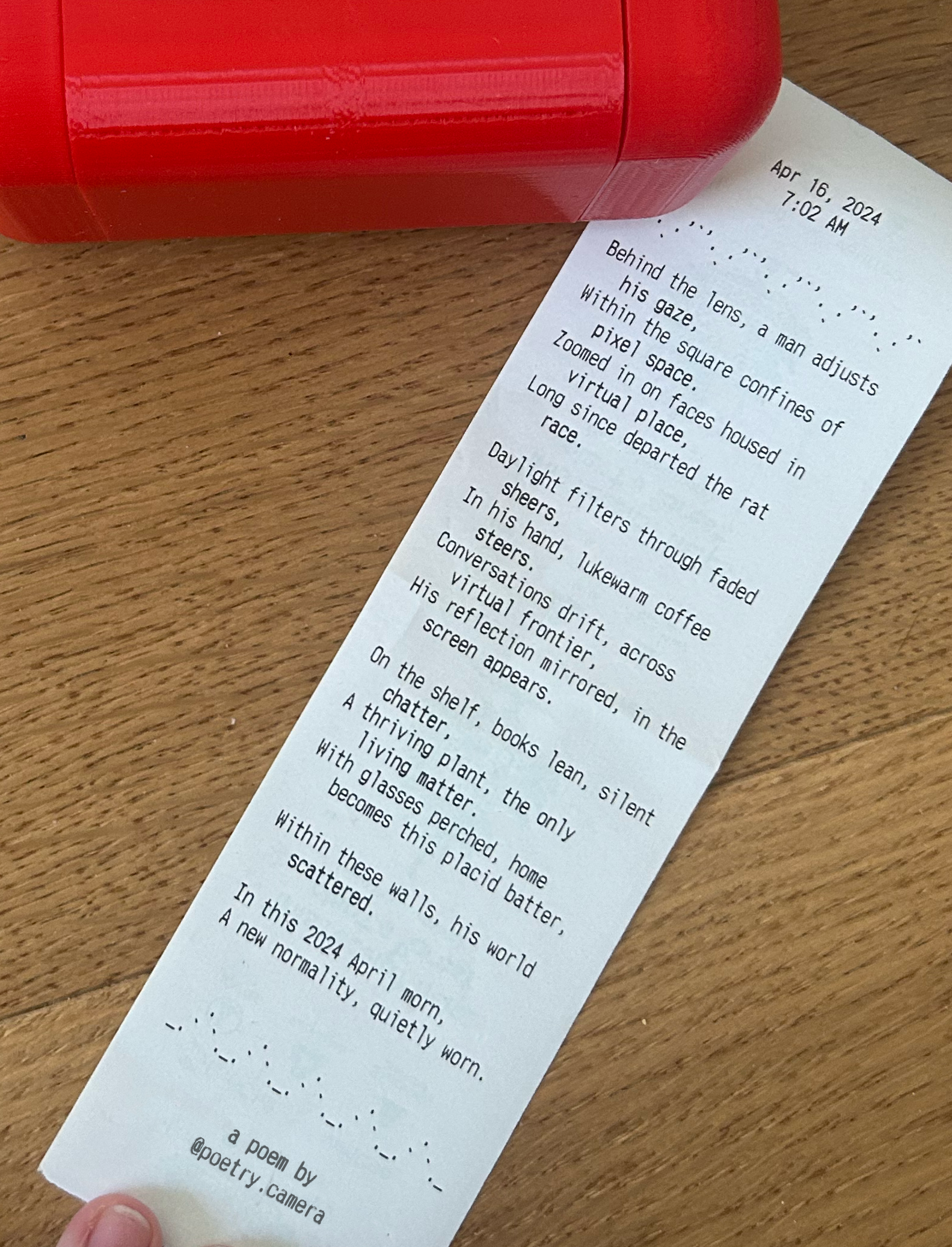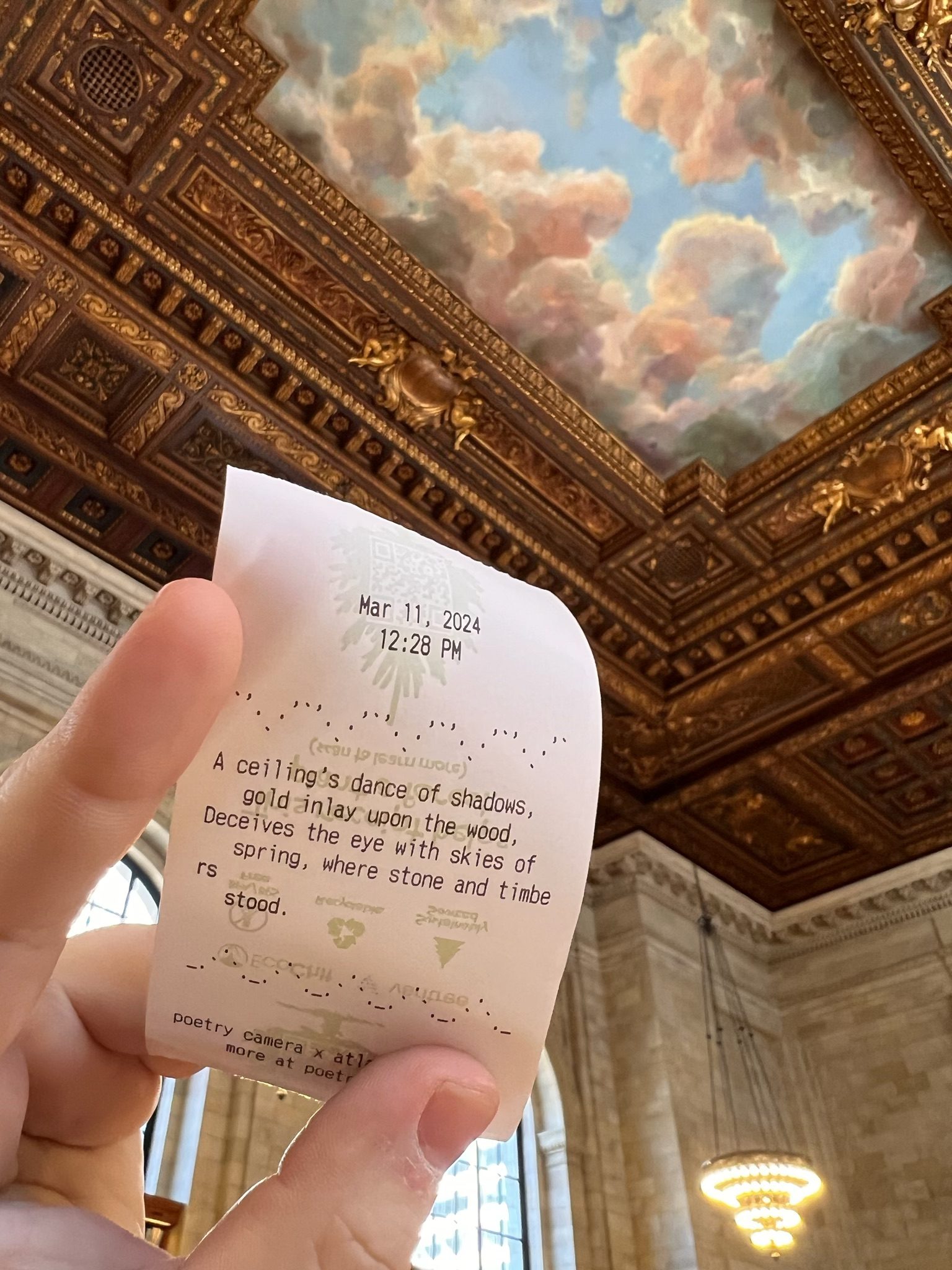Have you ever stood in front of a redwood and wondered, “Wouldn’t it be great if this was poetry instead of a tree?” Neither did Joyce Kilmer. Kelin Carolyn Zhang and Ryan Mather, however, have set out to bridge the gap between AI tech and poetry with their captivating brainchild — the Poetry Camera. The open source device combines cutting-edge technology with artistic vision, resulting in a creation that pushes the boundaries of both fields.
At first glance, the Poetry Camera seems like another gadget in the ever-evolving landscape of digital devices. However, upon closer inspection, it becomes evident that this is no ordinary camera. Instead of merely capturing images, the Poetry Camera takes the concept of photography to new heights by generating thought-provoking poetry (or, well, as thought-provoking as AI poetry can get) based on the visuals it encounters.
Zhang and Mather, the masterminds behind this project, have seamlessly blended their expertise in technology and art to create a technically impressive and aesthetically captivating device.
The story of the Poetry Camera began as a personal passion project for Zhang and Mather, who found themselves captivated by the idea of merging their love for technology with their appreciation for the arts. In the early stages of development, they spent countless hours tinkering with various components and experimenting with different AI models to bring their vision to life.
“The project’s origin is when I got access to GPT-3. My first instinct was to play Dungeons & Dragons with it because I’m a nerd. I figured ‘if this thing could play Dungeons & Dragons, that would be impressive.’ And yeah, it did work for that. This was back when you had to do prompt engineering. So it took some elbow grease to get it to work. But I also had this idea of maybe making some camera as a project,” says Mather. “What if you took a camera, but it was a reaction to Instagram culture? What if text comes out instead of a photo? … Everyone prefers the book version over the movie, so it’s like that for capturing moments.”
As they refined their prototype, Zhang and Mather began to share their creation with friends and family at social gatherings. The reactions they received were nothing short of astonishing. People were fascinated by the concept of a camera that could generate poetry based on what it saw. The device quickly became the center of attention, sparking lively discussions and igniting the imagination of all who encountered it.
These initial reactions were a powerful motivator for Zhang and Mather to continue refining their invention. They realized that the Poetry Camera had the potential to bridge the gap between technology and art in a way that resonated with people. As word of the Poetry Camera spread, the duo were inundated with inquiries from curious individuals eager to experience the device for themselves. This interest led them to consider the possibility of transforming their project into a potential commercial product, making the magic of the Poetry Camera accessible to a broader audience.
The tech
At the heart of this innovative device lies a Raspberry Pi, a credit card-sized single-board computer that packs a powerful punch. This tiny yet mighty component serves as the brain of the Poetry Camera, enabling it to capture images and communicate with OpenAI’s GPT-4 to generate poetry.
A Raspberry Pi captures the image and then employs computer vision algorithms to analyze the visual data. The AI models then interpret the image, identifying key elements, colors, patterns and emotions within the frame. This information serves as the foundation for the poetry-generation process.
Zhang pointed the camera at our Zoom interview:

And out came a poem:

Behind the lens, a man adjusts his gaze,
Within the square confines of pixel space.
Zoomed in on faces housed in virtual place,
Long since departed the rat race.Daylight filters through faded sheers,
In his hand, lukewarm coffee steers.
Conversations drift, across virtual frontier,
His reflection mirrored, in the screen appears.On the shelf, books lean, silent chatter,
A thriving plant, the only living matter.
With glasses perched, home becomes his placid batter,
Within this walls, his world scattered.In this 2024 April morn,
A new normality, quietly worn.A poem by @poetry.camera
Zhang theorizes that the reference to “departed from the rat race” is a reference to my Hawaiian shirt.
The inventors tell me that the Poetry Camera’s output is not limited to a single format. Because the device is open source, users can choose from various poetic forms — such as haiku, sonnet or free verse — depending on their preferences and ability and willingness to get involved with the source code.
As the Poetry Camera continues to evolve, Zhang and Mather are exploring new ways to enhance its capabilities. They constantly refine and select the AI models, expand the device’s prompts and experiment with advanced natural language processing techniques. The goal is to create a device that generates poetry and engages in meaningful dialogue with users, fostering a deeper connection between technology and the arts.
The intersection of art and technology
The Poetry Camera serves as a testament to the incredible potential at the intersection of art and technology. By harnessing the power of AI and machine learning, Zhang and Mather have created a device that not only captures the beauty of the world around us but also interprets it in a way that can be surprisingly touching. As technology, it’s simple, but I love how accessible Poetry Camera makes things. It becomes so easy to dare to dream and push the boundaries of what technology can achieve.
Screens dominate our daily lives; the Poetry Camera offers a refreshing departure from the norm. Rather than relying on a digital display to showcase its poetic outputs, the device employs a more tactile and immersive method of interaction. The generated poems are printed on paper, creating a physical embodiment of the artistic experience. The temporary nature of the art gets taken pretty far with Poetry Camera.

“We don’t save any of the images or the poems digitally. There are a few reasons for that: One, it’s easier. Two: privacy. Three, it adds extra meaning to the poems if they’re like these ephemeral sorts of artifacts. If you lose it, it’s gone,” Mather explains. “Everyone has a camera in their pocket through their cell phone now — we wanted to do something very different.”
We’ve seen new UIs with products like Plaud and the Humane Ai Pin — and this device continues in the same vein. It allows users to disconnect from the constant barrage of visual stimuli and engage with the Poetry Camera’s creations in a more mindful and contemplative manner. Not to get all art student, but the visceral experience of holding a printed poem in my hands is an invitation to reflect on the words, appreciate the beauty of the language and form a deeper connection with the artwork.
The design philosophy extends beyond the device, influencing the entire user experience. Zhang and Mather have carefully crafted the Poetry Camera to foster a sense of wonder and discovery. Capturing an image, waiting for the AI to generate a poem and then receiving the printed output creates a sense of anticipation and surprise, enhancing the overall engagement with the device.
A reflection of the future of AI and personal computing
Zhang and Mather’s design philosophy for the Poetry Camera reflects their broader vision for the future of personal computing and AI. They believe technology should be seamlessly integrated into our daily lives, enhancing our experiences without overwhelming us with constant stimuli. By creating a device that prioritizes simplicity and artistic expression, they are challenging the status quo and paving the way for a new era of technology.
“I think poetry cameras are a microcosm of what will happen to many industries with AI. Poetry cameras are unlike a traditional discipline: You never met someone who says, ‘Oh, I’m a poetry photographer for corporate events,’ laughs Zhang. Poetry Cameras are in between this established field of photography and poetry. It is this new, weird thing. Most importantly, watching people interact with them is enjoyable: People find childlike joy in their playful persona.”
What’s next?
As the Poetry Camera continues to captivate audiences and generate buzz, Zhang and Mather are carefully considering the future of their innovative creation. While the device began as a personal passion project, the overwhelmingly positive response has led them to explore the possibility of making it commercially available to a broader audience.
“After the first 100 times people asked, we said, ‘We’re not selling it,’ but after 101 questions, we started thinking about it in more detail, wondering if we should be making it available to people,” Zhang contemplates. “But at the same time, it’s an art project, you know? Our initial response was to leave capitalism out of it.”
However, true to their commitment to sustainability and mindful consumption, Zhang and Mather are taking time before rushing into mass production. Instead, they are taking a more measured approach, with the potential for limited product drops that prioritize quality over quantity. By carefully controlling the production process, they aim to ensure that each Poetry Camera is crafted with the utmost attention to detail and meets their high standards for performance and durability.
I challenged the team on having to buy a hardware product: Phones have cameras, internet connections and screens. Wouldn’t it be more sustainable to use hardware that already exists?

“The most sustainable thing would be not to make anything at all,” Zhang agrees. “But we initially started this as an open source DIY project, and we had all the instructions online; it was just that it’s hard for people to gather all the different parts needed. Initially, we played with the idea of creating a cardboard enclosure. But I’ve noticed that part of what makes people love and want to play with it is the sort of Poké Ball-polished product aesthetic. I think that for the Poetry Camera to come alive in its fullest form, it should be a polished-looking product. I don’t know how to approach it with sustainability in mind, but it’s important to us.”
Looking ahead, Zhang and Mather envision a future where the Poetry Camera is not just a novelty device but is also a catalyst for change in how we interact with technology and art. They hope their creation will inspire others to explore the intersection of these two fields, pushing the boundaries of what is possible and creating new forms of expression.
I love living in a world where enthusiastic hobbies intersect with art and technology, and this project falls perfectly into that Venn diagram.
“For me, this continues to be art because it’s about expressing. It’s a vehicle for shaping a world that we want to see, which is a world where people can play with this new technology: AI is not all doom and gloom. And it’s not just about AI mimicking humans in a deeper, faster and worse way,” concludes Zhang. “It’s about making something entirely new with its new technology and bringing out that inner child again. For this project, it’s not about making money — it’s about making that childish wonder possible again.”
If you want a closer look at the camera in action, TikTok seems to be the best resource.































Comment